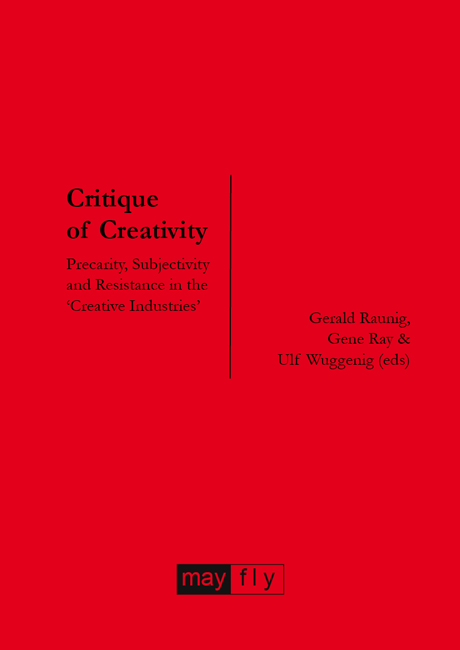Philippe Aigrain: Internet et Création (2008) [French]
Filed under book | Tags: · creativity, filesharing, internet, p2p

Internet et création ont partie liée, les échanges culturels alimentant la gigantesque expansion d’internet qui à son tour offre un espace à de nouvelles formes d’arts et d’expressions. Alors que certains n’y voient que destruction et anéantissement de la création, arc-boutés sur leur modèle de l’industrie culturelle de masse, Philippe Aigrain nous propose une autre vision.
Cet ouvrage défend la liberté des échanges entre internautes et un financement de la création. Il nous livre un véritable plaidoyer pour changer notre regard sur l’internet et développe des propositions concrètes pour organiser leur futur commun.
Corrigeant et affinant la Licence Globale de 2005, ces propositions seront nécessairement au coeur des débats de demain.
“Internet & Création” ne s’adresse pas qu’aux auteurs et artistes, producteurs et éditeurs ou aux internautes novices et aguerris. Il est à destination de tous, hommes et femmes qui veulent comprendre ce monde en pleine mutation où l’art et la culture seront demain dans nos mains et seront ce que nous en ferons.
Internet et création: comment reconnaître les échanges hors-marché sur internet en finançant et rémunérant la création?
Publisher In libro veritas, 2008
ISBN 2352091772, 9782352091776
118 pages
Electronic version of the book is published under Creative Commons FR 2.0 BY-NC-ND
Gerald Raunig, Gene Ray, Ulf Wuggenig (eds.): Critique of Creativity: Precarity, Subjectivity and Resistance in the ‘Creative Industries’ (2007–) [DE, EN]
Filed under book | Tags: · creative industries, creativity, critique, precariat, precarity, resistance, subjectivity

“Creativity is astir: reborn, re-conjured, re-branded, resurgent. The old myths of creation and creators – the hallowed labors and privileged agencies of demiurges and prime movers, of Biblical world-makers and self-fashioning artist-geniuses – are back underway, producing effects, circulating appeals. Much as the Catholic Church dresses the old creationism in the new gowns of ‘intelligent design’, the Creative Industries sound the clarion call to the Cultural Entrepreneurs. In the hype of the ‘creative class’ and the high flights of the digital bohemians, the renaissance of ‘the creatives’ is visibly enacted. The essays collected in this book analyze this complex resurgence of creation myths and formulate a contemporary critique of creativity.”
With contributions by: Brigitta Kuster, Maurizio Lazzarato, Esther Leslie, Isabell Lorey, Angela McRobbie, Raimund Minichbauer, Monika Mokre, Stefan Nowotny, Marion von Osten, Gerald Raunig, Gene Ray, Suely Rolnik, Vassilis Tsianos, Paolo Virno, Ulf Wuggenig
Publisher mayfly, London, in conjunction with the European Institute for Progressive Cultural Policies, 2011
Creative Commons Attribution-Noncommercial-No Derivative Works 3.0 Unported License
ISBN 9781906948139
234 pages
Publisher (new ed., DE)
Publisher (EN)
PDF, PDF, EPUB, EPUB (German, 2007/2016, updated on 2020-11-13)
PDF, PDF (English, updated on 2020-11-13)
Clay Shirky: Cognitive Surplus: Creativity and Generosity in a Connected Age (2010)
Filed under book | Tags: · creativity, internet, mass media, technology, web 2.0

The author of the breakout hit Here Comes Everybody reveals how new technology is changing us from consumers to collaborators, unleashing a torrent of creative production that will transform our world.
For decades, technology encouraged people to squander their time and intellect as passive consumers. Today, tech has finally caught up with human potential. In Cognitive Surplus, Internet guru Clay Shirky forecasts the thrilling changes we will all enjoy as new digital technology puts our untapped resources of talent and goodwill to use at last.
Since we Americans were suburbanized and educated by the postwar boom, we’ve had a surfeit of intellect, energy, and time-what Shirky calls a cognitive surplus. But this abundance had little impact on the common good because television consumed the lion’s share of it-and we consume TV passively, in isolation from one another. Now, for the first time, people are embracing new media that allow us to pool our efforts at vanishingly low cost. The results of this aggregated effort range from mind expanding-reference tools like Wikipedia-to lifesaving-such as Ushahidi.com, which has allowed Kenyans to sidestep government censorship and report on acts of violence in real time.
Shirky argues persuasively that this cognitive surplus-rather than being some strange new departure from normal behavior-actually returns our society to forms of collaboration that were natural to us up through the early twentieth century. He also charts the vast effects that our cognitive surplus- aided by new technologies-will have on twenty-first-century society, and how we can best exploit those effects. Shirky envisions an era of lower creative quality on average but greater innovation, an increase in transparency in all areas of society, and a dramatic rise in productivity that will transform our civilization.
The potential impact of cognitive surplus is enormous. As Shirky points out, Wikipedia was built out of roughly 1 percent of the man-hours that Americans spend watching TV every year. Wikipedia and other current products of cognitive surplus are only the iceberg’s tip. Shirky shows how society and our daily lives will be improved dramatically as we learn to exploit our goodwill and free time like never before.
Publisher Penguin Press, 2010
ISBN 1594202532, 9781594202537
242 pages
review (Jonathan V Last, The Weekly Standard)
PDF (EPUB)
Comment (0)
